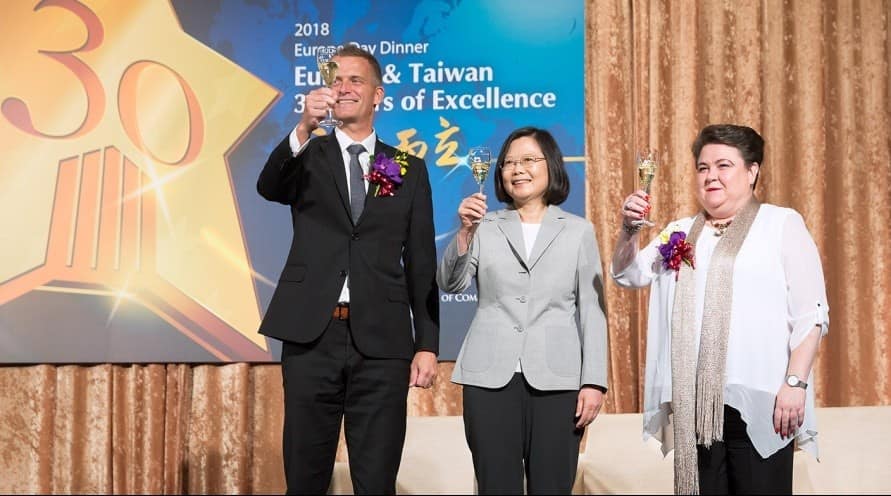2018 Europe Day Dinner

In his speech at the dinner ECCT Chairman Håkan Cervell began by highlighting some of the key milestones in the ECCT's 30-year history and the contribution of European companies to Taiwan's economic development. Since its founding in 1988 with just 50 members, the chamber has grown to become the largest organization representing over 860 individual members from European companies and organisations.
The chairman went on to say that the ECCT supports the government's commitment to support the development of its targeted "five + two emerging industries". In particular, he cited progress made over the past year to speed up the development of one of these, the green energy industry. He noted however that to reach the government's targets of 20% of energy from renewable energy sources by 2025, there are still many obstacles to overcome which require government support.
He made the point that European companies in the wind energy industry are committed to developing Taiwan into a regional manufacturing and support hub for wind energy in Asia. However, it will take time to develop local competence and expertise. In the meantime, in order to meet the renewable energy targets in time and to ensure the highest standards and quality, he urged that the localisation of the supply chain should be done gradually. He reiterated the point, made frequently over the past year, that ECCT members are global leaders in all aspects of the wind energy production and service supply chain and that there are great business opportunities for them, their local partners and Taiwan, as well as benefits to the broader economy, the creation of new and well-paying jobs, clean and affordable energy and a cleaner environment – all in all, a win-win for everyone.
On the subject of creating smart cities of the future, the chairman said that the right infrastructure has to be put in place such as 5G telecommunications, electric vehicle charging stations and smart grids. Moreover, the regulatory environment also has to be flexible enough to allow technological innovation and new business models.
On the subject of healthcare, the chairman lauded Taiwan's healthcare system as being one of the world's most efficient, accessible, and effective, offering quality care at affordable prices. However, he said that the system is facing challenges from an aging population and emerging chronic diseases. To assure long-term sustainability and to position Taiwan as a biomedical R&D and manufacturing hub, reform of the regulatory and reimbursement systems is needed.
The chairman lauded progress made on labour laws over the past year, which has made Taiwan's labour laws more flexible. He also called the passage of the Act for the Recruitment and Employment of Foreign Professionals a good first step. However, he called for more work to simplify and streamline the process to make it easier for foreigners to live and work in Taiwan. In addition, he said that introducing short-term business visas and allowing more foreign labourers to work in the service sector would help to ease the current skills and labour shortage.
Another subject raised by the chairman was unequal treatment of foreign nationals. He cited for example, different number formats for Republic of China (ROC) national ID cards and Alien Resident Certificate (ARC) cards, which denies ARC holders access to many services, which is a growing problem as ever more services go online. Other examples of unequal treatment include foreign residents not being eligible for electric vehicle subsidies or senior citizen discounts on the Taiwan High Speed Rail.
The chairman acknowledged that progress had been made in recent years towards international harmonisation, but said there remain instances where Taiwan authorities maintain standards and practices that are not aligned with international best practices, which are detrimental to both local and foreign firms operating in Taiwan. Licencing restrictions in many industries and certain financial regulations also deter foreign investments, he said. Given that further trade liberalisation measures would benefit both the EU and Taiwan and make Taiwan more attractive to investors, both foreign and domestic, the chairman reiterated the chamber's call to both Taiwan and EU authorities to expedite negotiations towards a Bilateral Investment Agreement. Such an agreement that addresses the remaining bilateral trade and investment barriers would be good for economic growth and for creating jobs in both Europe and Taiwan, he said.
Finally, the chairman said that the ECCT supports making English the second official language of Taiwan. As English is the global language of business, diplomacy and international organisations, making English an official language would make Taiwan more attractive to international investors and give Taiwan more access to the world, he said.
The chairman concluded his speech by saying that the ECCT has played an integral part in Taiwan's history over the past 30 years and that its members want to be part of the next 30 years of development and progress by working together with the government.
The Europe Day dinner was an opportunity to enjoy some superb entertainment and cuisine. The dinner also served as a fund-raising event for charity. During the evening, ECCT Chairman Håkan Cervell handed over a donation to the Syin-Lu foundation, represented by its president, Pony Hsu. Established in 1987, the Syin-Lu Foundation is a non-profit organization that promotes empowerment and economic self-sufficiency for the handicapped in Taiwan. A portion of the proceeds from the dinner have been donated to the foundation, every year for the past 20 years.
